[MALAYSIA] If you've been keeping a close eye on your kitchen expenses, you may have noticed the steep rise in coconut milk prices! This presents a dilemma for those trying to stick to a tight budget, all while desiring to serve up classic dishes that tantalize the taste buds.
According to the Department of Statistics Malaysia (DOSM), the price of santan has seen an annual increase of 2.2% from 2019 to 2023, remaining fairly stable between RM10.20 and RM11 per kilogram. However, last year, the price jumped dramatically to RM13.05 per kilogram, marking a significant 17.7% increase. As of February this year, the cost reached a startling RM20 per kilogram.
Most of the price hike appears to have occurred since October 2024, prompting the question: what caused this surge?
Experts attribute the price spike to a combination of factors that go beyond just unpredictable weather. Global supply chain disruptions, worsened by rising fuel and transportation costs, have placed additional strain on the coconut market. Labor shortages in key coconut-producing regions have also slowed down harvesting and processing, deepening the supply shortage.
Weather Impact
Since last July, Malaysia has experienced a shortage of coconuts, with the Federal Agricultural Marketing Authority (Fama) reporting a decline in coconut production of up to 50% in several major markets. The cause? Unpredictable weather, particularly less rainfall.
Malaysia’s tropical climate typically supports healthy coconut growth, benefiting from year-round sunshine and consistent rainfall. However, prolonged heat and drought cause young coconuts to fall prematurely, preventing them from maturing into the older coconuts used for producing santan. Farmers had expected heavier rains last October, but the rainfall was insufficient. As a result, more young coconuts fell, and Malaysians purchased more to counter the heat.
Climate change scientists warn that such erratic weather could become more frequent, posing long-term challenges for Malaysia’s coconut industry. The Malaysian Agricultural Research and Development Institute (MARDI) has urged farmers to consider drought-resistant coconut varieties and modern irrigation techniques to reduce future losses.
Imports and Global Supply Issues
It’s not just local factors affecting the coconut market—Malaysia doesn't produce enough to meet domestic demand. According to DOSM, Malaysia's self-sufficiency ratio for coconuts stood at 70% in 2023, with the remaining 30% imported, mainly from Indonesia.
However, Indonesia has faced similar challenges with hot weather and insufficient rainfall. The price of Indonesian coconuts, which once cost RM1.10 each, surged to RM1.80 in October and doubled to RM2.20 by March.
Further compounding the issue is the rising global demand for Indonesian coconuts, particularly from China, which has driven up prices in international markets. Meanwhile, the Philippines, the world’s largest coconut producer, has projected a 20% decrease in output this year due to extreme weather events. Trade analysts point out that Malaysia’s reliance on imports makes it vulnerable to global price shifts. There have been calls for greater regional cooperation among ASEAN nations to stabilize coconut supply, with recommendations for joint investments in climate-resilient farming and shared distribution networks.
Local Efforts to Boost Production
In recent years, Malaysia has focused on increasing its coconut production. From 2021 to 2023, local coconut production rose by 11.9%, from 557,354 tonnes to 623,663 tonnes. However, total coconut consumption also climbed by 10.3%, from 811,809 tonnes to 895,396 tonnes in the same period. While local farmers are gradually catching up with domestic demand, Malaysia is still some way from achieving full self-sufficiency.
Agricultural Minister Mohamad Sabu highlighted that between 2021 and 2024, the government allocated RM15 million to plant and replant new coconut trees across 1,891 hectares of land and rehabilitate 285 hectares of coconut farms.
In 2023, RM3 million was dedicated to producing over 524,000 coconut saplings. However, as coconuts take around five years to start yielding fruit, the benefits of these efforts will not be realized immediately.
Short-Term Solutions
To address the immediate supply gap, the government announced the import of 734 tonnes of mature, dehusked coconuts, valued at RM2.01 million, from both Indonesia and Sabah as of March 4, to meet demand during the Aidilfitri period.
Mohamad also mentioned that the Agriculture and Food Security Ministry is implementing the Coconut Industry Development Programme 2021-2025 under the 12th Malaysia Plan, which aims to provide incentives to farmers to boost local coconut production. Additionally, coconut milk has been added to the Festive Season Maximum Price Control Scheme, with set price limits as follows:
- Peninsular Malaysia: RM17.50 per kilogram
- Labuan: RM15 per kilogram
- Sabah: RM12 per kilogram
- Sarawak: RM9 per kilogram
Consumer groups have welcomed the price controls, though they emphasized that effective enforcement is crucial to ensure compliance. They also recommended that shoppers compare prices across wet markets, supermarkets, and online platforms, as some vendors might still sell at inflated rates despite the regulations.
Looking Ahead
While alternatives like evaporated milk, cooking cream, yogurt, and dairy or non-dairy milk can be used as substitutes for coconut milk, they aren’t quite the same as the beloved santan. However, this might be an opportunity to experiment with new recipes and get creative in the kitchen. On the bright side, using less coconut milk could also have health benefits, particularly when it comes to managing cholesterol!














